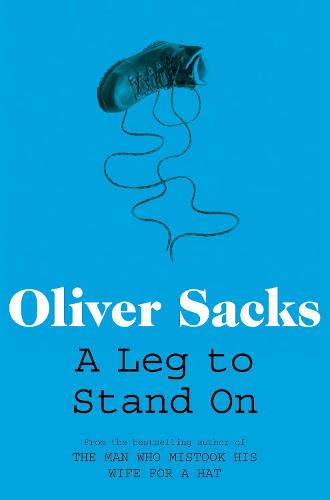From The Reader Bookshelf… A Leg to Stand On by Oliver Sacks
As part of our ongoing work around The Reader Bookshelf, we've asked staff to share their thoughts about some of the inspirational texts in the collection.
This week, Frances Macmillan, Head of Publishing at The Reader, gives us her take on A Leg to Stand On by Oliver Sacks.

Words by Frances Macmillan
By his death in 2015 Oliver Sacks was a world-famous physician, neurologist and writer. If you’ve heard of him, it’s possibly because of his most famous book with the memorable title The Man Who Mistook His Wife for a Hat, or for his book Awakenings, which was made into a film with Robert De Niro and Robin Williams. A Leg to Stand On is lesser-known, but not to The Reader – it’s been recommended several times in past issues of the magazine. I’d not read it, but because of those past recommendations in the mag it had been on the reading pile for quite some time. So its inclusion on the Bookshelf was the spur to finally pick it up and discover why colleagues at The Reader so value this book.
After reading a few pages I turned and looked at the date of publication on the copyright page, and was quite surprised to discover it was written in 1984. Oliver Sack’s tone is quite formal, in a way, and he sounded to me more like an eighteenth-century gentleman, as he marches gaily up a mountain somewhere in Norway, enjoying the morning mists and the solitude and the beauty of his surroundings, and ignoring the sign warning ‘Beware of the Bull’:
‘I practically trod on what lay before me – an enormous animal sitting on the path, and indeed totally occupying the path, whose presence had been hidden by the rounded bulk of the rock.’
Sacks is so startled by this encounter with the bull that he turns and runs, madly, down the rocky mountain, slips, falls and injures his left leg severely – ‘[it was] totally limp and flail and gave way beneath me like a piece of spaghetti’. This is the beginning of Sacks’ plunge into helplessness, or into becoming a patient. For he struggles down the mountain, is rescued, his leg is operated on and apparently ‘fixed’. But he still cannot make the leg work. He cannot remember how to move it – it doesn’t feel like part of himself.
‘I could no longer remember having a leg. I could no longer remember how I had ever walked and climbed. I felt inconceivably cut off from the person who had walked and run and climbed just five days before. There was only a formal continuity between us. There was a gap – an absolute gap – between then and now; and in that gap, into the void, the former ‘I’ had vanished.’
It might sound incredible – it certainly does sound that way to Sacks’ surgeon, who impatiently tells Sacks there is nothing wrong with him, and to the Registrar who says, (much worse), ‘I’ve never heard anything like this before’. But of course, Sacks’ experience though extreme, isn’t unique – that yawning gap he describes in the quote above can open up in any life after a physical or emotional jolt. There is a gap too between one person’s intense interior life, and another person’s, and part of the generous effort Oliver Sacks is making in this book seems to be to try and bridge that gap by explaining in detail what the process was that he underwent, from the terrifying state in which everything he had been (reason, action, willpower) couldn’t help him, through slow recovery of himself, the leg, mobility and wholeness.
I’m not sure this is a book to read cover to cover – I’ve never minded particularly skipping over bits of books that I don’t understand and coming back to them later. I can’t always follow Oliver Sacks’ discussion of neurology and philosophy in the last few chapters, but there’s so much in this book that is helpful in thinking about the deeply personal nature of reality, the imaginative leaps needed to try and understand one another, the precariousness and difficulty of trying to make those leaps. Sacks’ fellow neurologist and mentor wrote to him, ‘I’m sorry this happened to you… but if such a thing happens it can only be understood, and used.’ Easier said than done, but we can be grateful that Sacks followed doctor’s orders, tried to understand and use his experience, and wrote this book.
Share
Related Articles

World Book Day® and The Reader celebrate the fun of reading
National reading charity World Book Day is partnering with Shared Reading charity The Reader for a fun-filled day in…

February’s Title Pick for Children: Trash by Andy Mulligan
Through our Bookshelf this year we are exploring the different places that people call home. From the very beginning…

February’s Title Pick for Adults: Great Expectations by Charles Dickens
Great Expectations by Charles Dickens The Reader’s staff and volunteers have been leading Shared Reading groups in many different…


